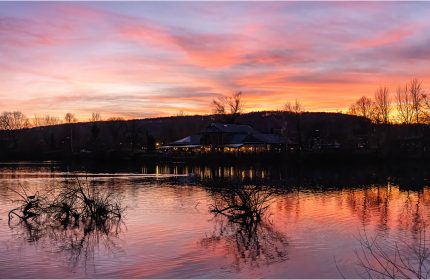NHS could save £635m through ‘green social prescribing’, study suggests
Analysis found the mental and physical health benefits of being in nature would outweigh the investment costs
The NHS could save more than £635 million a year by signing some patients up to nature-based health and wellbeing programmes, according to a report by The Wildlife Trusts.
In July 2020, the Government announced a £4 million investment in “green social prescribing” which aims to improve people’s mental health and wellbeing by connecting them with nature in schemes involving walking, community gardening or food growing.
These can serve as an alternative to social care, housing, or other community groups and are prescribed by a GP.
A Government survey found 90% of people said being in a green space was good for their mental health.
The NHS has said it is building up the number of link workers, who are there to give their time helping people take part in social activities, such as those run by The Wildlife Trusts.
Published under the title, A Natural Health Service: Improving Lives and Saving Money, their analysis found that the amount of money saved in healthcare costs would be greater than the money invested.
Environmental engineers Ricardo and the Institute of Occupational Medicine Health analysed five Wildlife Trusts programmes to see how much they benefitted the NHS.
They found that if just one of them was taken up by everyone likely to do so – estimated to be about 1.2 million people – the total healthcare savings would be £635.6 million.
Dr Amir Khan, NHS doctor and vice-president of The Wildlife Trusts, said: “What excites me about this research is that it shows the potential of Wildlife Trusts programmes to work alongside and reduce reliance on NHS services.
“Programmes that tackle some of the causes of preventable illnesses: social isolation that can lead to feelings of loneliness or depression, physical inactivity – which is linked to musculoskeletal problems – and a lack of skills or prospects leading to economic inactivity.
“The Wildlife Trusts’ programmes can shoulder some of the burden of mainstream NHS services and they should be available to all health professionals, to refer patients to, where appropriate.”
Wild at Heart, which helps people learn new skills through nature-based activities and is run by Sheffield and Rotherham Wildlife Trust, was found to save £38,646 in the healthcare costs of 82 participants over a year, with every £1 invested reducing £1.19 from the NHS cost burden.
Another project called MyPlace by Lancashire Wildlife Trust, which helps improve mental and physical health, was found to reduce healthcare costs by £7,024 and employment-related costs from mental health by £28,442, saving the NHS £2.16 for every £1 invested.

Growing food is one way of getting people closer to nature
The Wildlife Trusts are calling on the UK Government to integrate green social prescribing into community health and social care everywhere, encourage shared investment from Government departments working on housing, employment, community cohesion, transport and culture, and provide support to partnerships between healthcare services and organisations like The Wildlife Trusts.
Natural England said it has been working with the housing and environment departments in Government, Sport England and various local community and health partners, providing a total of £5.77 million to green social prescribing.
These include wild swimming and gardening projects and Natural England said it is also working with Wessex Water, Bath University and Bath and North-East Somerset Council to explore how these schemes could lead to less pharmaceutical pollution ending up in rivers through sewage discharges.
Dom Higgins, head of health and education at The Wildlife Trusts, said: “This new research proves the immense value of nature-based projects for improving individual health and helping to ease the burden on the NHS.
“Nature is an essential part of health and social care, but we are not maximising that potential. Green prescribing works and the more we can develop these kinds of programmes, the greater the benefit to society.”
The Press Association
Latest posts by The Press Association (see all)
- BBC to air two-part Call The Midwife Christmas special - December 23, 2024
- 6 mind sports to exercise your brain and keep you sharp - December 20, 2024
- Quiz: What classic Christmas food or drink are you? - December 20, 2024
- Leftover turkey and watercress pie - December 20, 2024
- Catherine and William choose family shot for Christmas card photograph - December 19, 2024




















